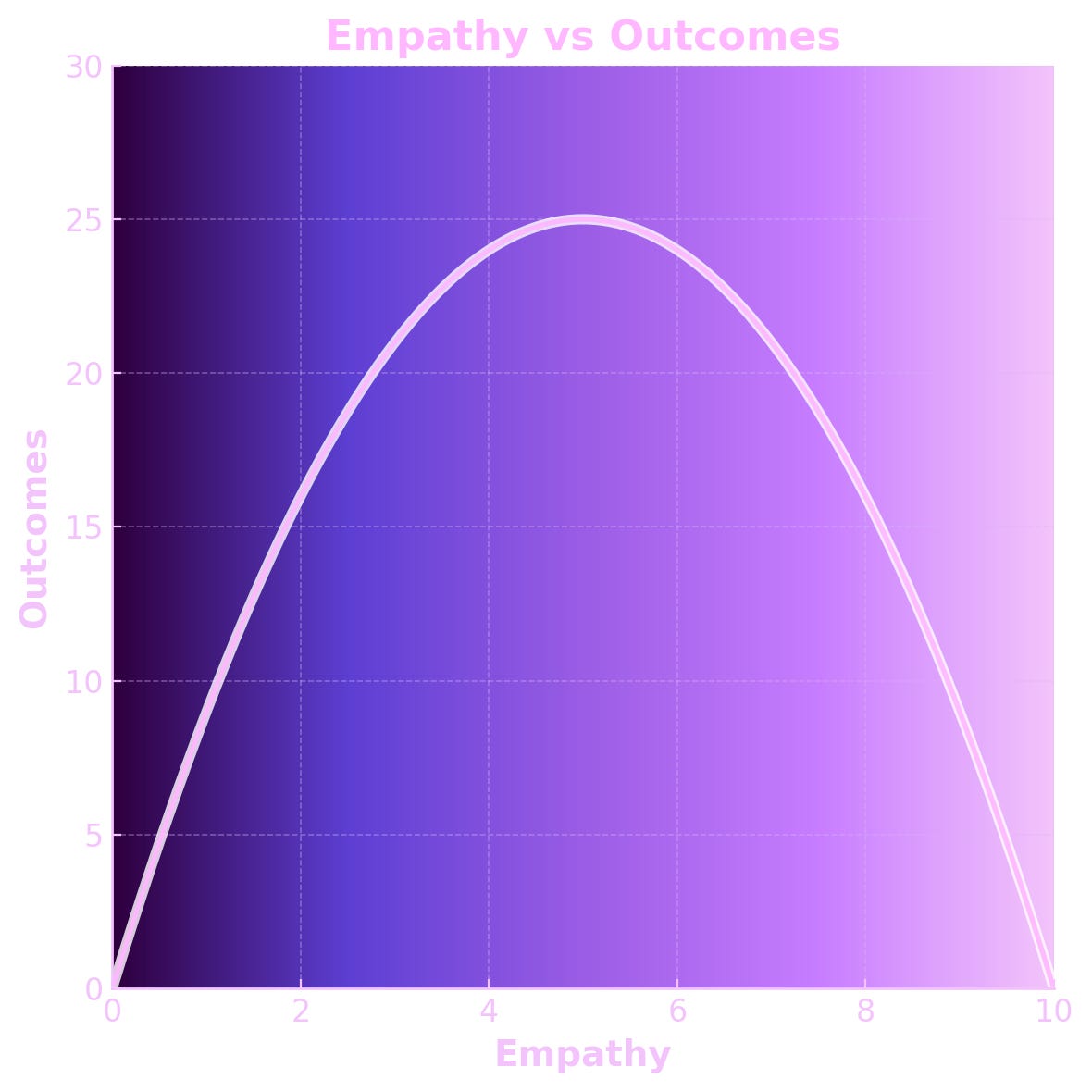The unbearable weight of being empathetic
How the overly empathetic manager is as bad as the manager with no empathy.
We’ve long known that empathy is one of the key foundational skills for managers. It has benefits across innovation, leadership, financial results and even the physical health of teams:
Per our ‘Building Better Managers’ report:
When managers lack empathy, employees are 34% less innovative and 43% less engaged (Catalyst, 2021);
High empathy predicts leadership effectiveness (in terms of motivation, openness, communication, trust and adaptability) and organizational performance (in terms of profit and growth) (Rahman & Castelli, 2013)';
Employees working for empathetic managers experience fewer physical ailments and more positive emotions (Scott et al., 2010).
Any good management development program should then, by extension, focus on building the empathy of managers.
To a point.
In new research that Mindtools will be publishing in the coming days, we reveal that empathy isn’t like other skills.
With most skills, outcomes improve as the skill increases:
🏌️Practicing golf regularly reduces the number of shots it takes to get the ball in the hole (others tell me).
🧑💼 In a business environment, our data tells us that increases in coaching skills lead to predictable increases in sales performance (more on that in a later edition).
With empathy, though, at a certain point, outcomes start to decline. Empathy, as a skill, is curvilinear:
In our new research, we asked 279 managers from around the world to complete our Manager Skills Assessment. This scientifically-validated tool would give them (and us) an accurate measure of their skills across 12 key areas.
But, prior to taking the assessment, we also asked them about recent business outcomes. This included sales performance and staff retention.
And we interviewed managers to gather personal stories that would help us understand the quantitative results.
What we discovered is that managers need to balance empathy with other core skills, like social sensitivity and self-awareness.
When a manager is too empathetic, they start to make sub-optimal decisions. They fail to delegate, stifle team development and reduce trust.
These results are supported by Kaiser (2024), who found that highly empathetic managers and leaders are actually more likely to undermine productivity than those who lack empathy altogether.
For those of us who work in manager development, then, we need to be careful. We need to build the empathy of managers, but constantly prompt them to think through the impact of their decisions.
Are they being a ‘nice boss’?
Or are they shouldering too much emotional weight and not respecting the skills and capabilities of their teams?
Looking for help developing your managers? The award-winning learning designers at Mindtools and Kineo can help. Reply to this newsletter from your inbox or email custom@mindtools.com if you want to build better managers today!
🎧 On the podcast
Why does L&D so often feel like the drive-thru window of requests: ’One leadership program, hold the ROI please’?
As L&D professionals, it’s not who we understand ourselves to be. So how can we flip the script so that we’re seen and treated as strategic business partners?
In this week’s episode of The Mindtools L&D Podcast, we’re joined by Jess Almlie, author of Order taker no more!
We discuss:
What keeps us stuck in an order taker role?
What are the foundations of great strategic business partnering?
What might a move into this new role look like?
Check out the episode below. 👇
You can subscribe to the podcast on iTunes, Spotify or the podcast page of our website.
📖 Deep dive
We’ve reached an inflexion point for AI adoption.
That’s the take of our friend Don Taylor and his research partner Eglė Vinauskaitė.
For the first time in three years, more than half of respondents taking part in their ‘AI in L&D’ survey are actively using AI at work, rather than just experimenting.
And while content production remains the primary use case, operational uses, insight gathering and workforce enablement are becoming more common.
What’s nice about this study in particular is the overlay of case studies on top of the quantitative data.
Microsoft, for example, are using AI simulations similar to what Mindtools offer to give team members an opportunity to practice having conversations with customers or other stakeholders.
ServiceNow use AI as an evaluation tool, with feedback provided to learners based on video pitches that they had recorded.
Events and communications company MCI Group have leveraged their AI-powered platform to shift L&D’s focus from training delivery to transformation partner, inviting subject matter experts to create their own learning products.
Taylor, D. and Vinauskaitė, E. (2025). ‘AI in L&D: The Race for Impact’
👹 Missing links
🦾 Better than Google, better than friends
Back in 2016, we published a study looking at ‘The Secret Lives of UK Managers’. We wanted to know what managers did when they encountered an unfamiliar challenge or problem. Typically, they would ask a colleague for help or Google it. Our ‘Building Better Managers’ report in 2024 backed up this finding. Now a new paper points to evidence that, when students encounter a challenge, they increasingly turn to ChatGPT. Hardly surprising but, according to the paper, this is paired with an increasing sense of isolation and demotivation. As work becomes more remote and AI replaces human interaction, our quest for quick answers is likely to have negative long-term consequences.
🤖 Breaking: Study finds personalized support is more personalized
What to make of a recent Boston Consulting Group study comparing Generative AI tutoring to a traditional classroom approach? 139 participants, split into two groups, were measured to compare both approaches to developing ‘problem framing’ skills. The results show learning gains that were ‘on a par’ for both groups, but with the GenAI approach offering greater personalization and 23% less time spent. After the study, 53% expressed a preference for the AI approach. This HBR write-up on the study describes how a GenAI tutor can ‘revolutionize’ workplace learning, which seems to overstate the results. I’m not against it (Mindtools offer both an AI coach and AI skills practice), but I still believe how these are deployed matters as much as the technology. Better to say: ‘AI is slightly more effective if you can get people to use it’. One of the major benefits of a classroom setting is that participants have protected time away from their inbox.
AI has made app development easier than ever, with tools like Lovable, Cursor and Claude building functional tools based on just a few prompts. In this newsletter, Lenny Rachitsky shares 50 examples to get you thinking about what you, too, could create. They range from workplace productivity tools, to activity trackers and digital experiences for kids. What’s striking, though, is how specific the use cases get. If you wish there ‘was an app for that’, now there can be! Check out the full list for some ideas to get you started.
👋 And finally…
I’ve long struggled to understand what my more business-minded colleagues are talking about, so this clip was a useful introduction to ‘the language of business’.
👍 Thanks!
Thanks for reading The L&D Dispatch from Mind Tools! If you’d like to speak to us, work with us, or make a suggestion, you can email custom@mindtools.com.
Or just hit reply to this email!
Hey here’s a thing! If you’ve reached all the way to the end of this newsletter, then you must really love it!
Why not share that love by hitting the button below, or just forward it to a friend?



